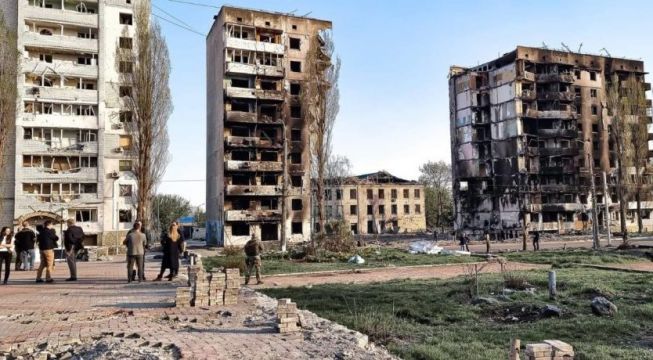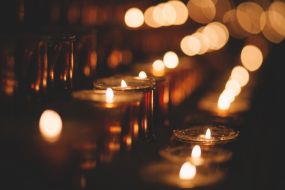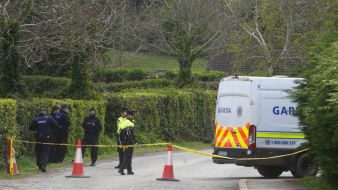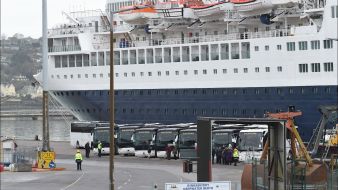A Senator has described the "harrowing" evidence of war crimes he witnessed on a recent trip to Ukraine.
Fine Gael Senators Barry Ward and Garret Ahearn travelled to Ukraine after an invitation from the Speaker of the Ukrainian parliament, Ruslan Stefanchuk.
The two are part of a group called United for Ukraine, and made the trip from May 5th-7th along with parliamentarians from 20 other countries including Poland, Lithuania, Estonia, Romania, Austria, Italy, Belgium, and Canada.
Mr Ward and Mr Ahearn flew to Warsaw in Poland before a bus and train journey to Kyiv that took 15 hours.
Mr Ward told BreakingNews.ie that he was initially unsure about the trip, however, he explained Ukrainians want as many politicians as possible to come and witness the evidence of war crimes amid the Russian invasion.
"When I was asked to go I kind of thought, would I not just be detracting from their ability to get on with the stuff they need to deal with, but they were incredibly grateful.
"You feel like a bit of a fraud going into meetings, and they’re saying ‘thanks for coming out, you’re so brave’. You’re thinking ‘we’re leaving in a couple of days, so not that brave’.
"The gratitude was palpable, they feel strongly that they need people to witness what is happening, and when the time comes to bear witness to the facts of what happened there."
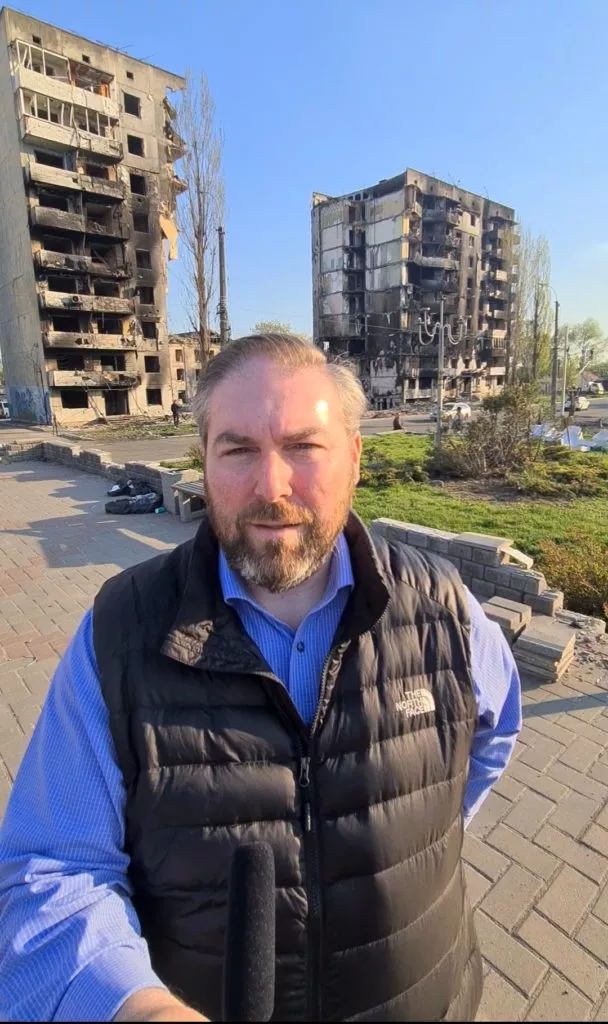
He added: "They want people to do two things; to hear and see what’s happening and hear their testimony, and also there is an important expression of solidarity in that process as well. That’s why we went out there, to bear witness to what is happening and to support Ukrainians at least morally or whatever way we could."
The pair were based in Kyiv, where they attended meetings in the Ukrainian parliament and Ministry of Defence, but also visited Borodyanka, Bucha and Irpina.
More than 1,000 bodies have been discovered in the Bucha area, a suburb of Kyiv, where Ukrainian authorities say there is overwhelming evidence of war crimes and abuse committed by Russian soldiers.
Mr Ward said it was emotional visiting Bucha, from where pictures of mass graves have been seen around the world.
"They found 107 bodies in a mass grave in the grounds of a church, the church of St Andrei which was built only four years ago. The Russians had basically dug trenches and dumped bodies in them.
"Some of those people had their hands tied behind their backs, some were blindfolded, all of them were from Bucha and four of them were children, so very harrowing stuff."
Mr Ward said 11 of these bodies had to be removed for forensic examination "because they were disfigured or burned".
"There were French forensic examiners there two days before us taking DNA samples which they are hoping to match with the families of people whose loved ones have gone missing."
Mr Ward said the church is now being used as a reminder of the atrocities that occurred in Bucha.
"The church itself, because it is new, the interior hasn’t been decorated like a church, so it’s bare space, and they’ve set up a photographic exhibition.
"They have some blown up photographs of the exhumation of the bodies... it’s upsetting. They also have pictures of people around Bucha whose bodies have been found.



"As someone put it to me, Bucha is like Dún Laoghaire or Greystones, it’s a middle class suburb of Kyiv.
"The Irpin river flows north-west of Kyiv, and it’s the far side of the river from Kyiv, it’s not very far away.
"It had a population of 45,000 people. Most of them were evacuated after the Russian invasion, but there were about 3,000-4,000 still there. Some of them couldn’t leave, a lot were older people.
"In the photographs you see it could be an ordinary suburban house and outside there is a woman, who could be your mother, whose body is just in the gutter outside the house where she has been shot.
"There is another one of a man clearly on his way home from the shops, with bags full of groceries, and he’s just dropped where he has been shot.
"In another one, somebody was cycling and their bicycle was still between their legs. It really brings it home - these were ordinary people going about their lives like you or me, and they were subjected to this sudden and unjustified brutality."
Many of the images of bombed out buildings come from another suburb of Kyiv, Borodyanka, which has been heavily impacted by Russian shelling.

Seeing people's homes destroyed was a surreal experience, Mr Ward said.
"Borodyanka is really badly damaged. At one point I was standing in front of two apartment buildings and I realised as you stood there was a picture I recognised, it had been one building that had a building sized hole blown in the middle of it. The damage is extraordinary, and the charring on everything.
"There’s a statue of a Ukrainian literary figure that the Russians peppered with bullets, that kind of thing.

"What’s also notable is as you look at those buildings they are ordinary apartment buildings, like you might see in a suburb of Dublin. They are private homes, people were eating their dinner, paying their mortgages, spending time with their families just weeks ago and now they’re gone.
"If your apartment is still standing, the buildings are so badly damaged you could not use it anyway.
"They will have to demolish most of those apartment blocks because they are not structurally sound any more.
"There is also an issue with something called depleted uranium, which is a by-product of nuclear weapons. Uranium that has been used to generate nuclear power, that by-product is really hard, so they use it to tip bullets and missiles because at the moment of impact it will penetrate more material than a standard shell will.
"When depleted uranium hits a surface like that it shatters into millions of microscopic particles that are radioactive. Not as much as somewhere like Chernobyl, but if people ingest them it will cause cancers and illnesses in the future. All of these issues will endure long after the war."

Mr Ward called the "determination and resilience" of Ukrainian people "remarkable".
"Actually they are quite determined to win this war as they put it, they haven’t defined what winning the war means, but they are determined to repel the Russian attacks and deal with the consequences. In the meetings we went to, there were four themes they referred to time and again."
Three of these issues were military assistance, sanctions and justice for the people who have been subjected to war crimes.

The other request was "chilling", he said.
"One of the things they asked for which was a little bit chilling, was protective equipment to deal with chemical weapon attacks. That’s what they fear is coming next," he added.
Mr Ward, who also works as a criminal barrister and is a counsel before the International Criminal Court (ICC), also spoke to the Ukrainian prosecutor.

He explained the process of charging Russia with war crimes will be extremely difficult, exacerbated by the fact Moscow does not recognise the ICC. However, the gathering of evidence is already well under way.
"They have identified and registered over 10,000 individual war crimes. They are putting together an evidential packet in relation to each one of them and Helen McEntee has been good on this. She has said Ireland will join a European central repository of evidence of those war crimes, so we hope they will eventually come before The Hague.
"I have a little bit of experience with that because I am a criminal barrister and counsel before the International Criminal Court, so I had a very deep chat with the prosecutor on that subject, he knows what he’s doing, he’s very organised, and I think they are a good way down the road in preparing for that eventuality because it is coming."

He added: "Key to that is Karim Khan, the ICC prosecutor has opened a dossier on this. The ICC has recognised the need for a file to be opened and investigations to take place, there is international consensus behind that, so the investigations will take place.
"As to whether you can be confident on anything I wouldn’t say that, but I would be very surprised if there are not indictments. It seems there is plenty of evidence to establish offences have been committed.
"The difficulty is where do you go from there with a country that is not a signatory to the ICC.
"Vladimir Putin is not going to recognise the jurisdiction of the ICC to arrest him for example, or any of his generals for that matter. You get into an international jurisdictional issue then and you have a situation where warrants are out for these guy’s arrests but if they don’t leave Russia these warrants could never be executed.
"For these reasons I don’t think it’s likely the likes of Vladimir Putin will be arrested, but it will make his life post-war very difficult because he won’t even be able to leave Russia, that’s an important consideration too."
